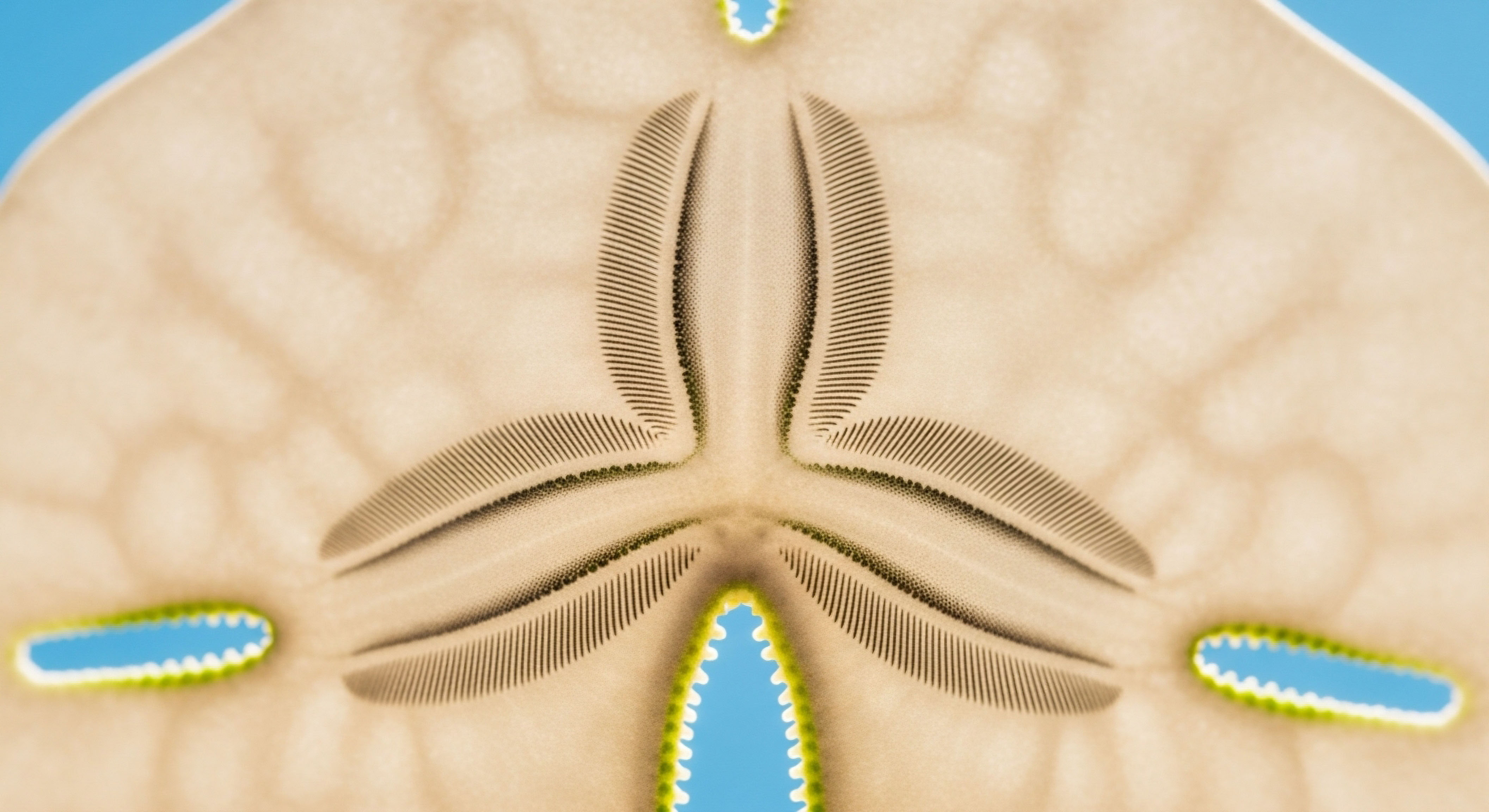

Neural Sovereignty ∞ Your Biological Imperative
The modern world demands an unparalleled degree of mental fortitude. Daily existence is a relentless barrage of information, stress, and complexity, each interaction a potential drain on cognitive reserves. Many perceive mental resilience as a purely psychological construct, a matter of mindset or willpower.
A deeper examination reveals its profound biological underpinnings, a complex interplay of neuroendocrine systems, metabolic function, and cellular integrity. The capacity to withstand stress, maintain focus, and adapt to change stems directly from the finely tuned mechanisms governing your brain and body.
Consider the hypothalamic-pituitary-adrenal (HPA) axis, the central command system orchestrating your stress response. Chronic activation of this axis, a common byproduct of contemporary living, leads to a sustained elevation of cortisol. Prolonged cortisol exposure, while essential for acute survival, diminishes neurogenesis in the hippocampus, impairs prefrontal cortex function, and compromises synaptic plasticity.
This biological erosion manifests as brain fog, diminished memory, heightened anxiety, and a palpable reduction in adaptive capacity. The consequences extend beyond transient discomfort; they fundamentally compromise your ability to operate at peak cognitive and emotional velocity.
Metabolic health stands as a foundational pillar for mental resilience. The brain, an energetically demanding organ, relies on a stable and efficient supply of glucose and ketones. Insulin resistance, often a silent precursor to systemic metabolic dysfunction, starves neural tissue of its primary fuel source.
This metabolic inefficiency compromises neuronal signaling, increases oxidative stress, and contributes to neuroinflammation. A brain deprived of optimal energy metabolism struggles to maintain coherence, focus, and emotional regulation. The connection between stable blood glucose and sustained cognitive output is undeniable, a direct line from cellular energetics to mental clarity.
Research indicates chronic cortisol elevation can reduce hippocampal volume by up to 15%, directly impacting memory and emotional regulation.
Neurotransmitters, the chemical messengers of the brain, dictate mood, motivation, and cognitive processing. Dopamine, serotonin, acetylcholine, and GABA each contribute to a delicate neurochemical balance. Imbalances, influenced by genetic predispositions, environmental stressors, and lifestyle choices, directly compromise mental equilibrium. Serotonin deficits contribute to mood dysregulation, while suboptimal dopamine levels impair motivation and executive function. Achieving neural sovereignty demands a meticulous understanding of these biological currents, moving beyond superficial coping strategies to address the root physiological drivers.
The very structure of your brain, its capacity for neuroplasticity ∞ the ability to form new connections and adapt ∞ is a dynamic process influenced by circulating hormones and trophic factors. Brain-Derived Neurotrophic Factor (BDNF), a protein crucial for neuronal growth and survival, acts as a molecular fertilizer for the brain.
Levels of BDNF respond to physical activity, sleep quality, and specific nutritional inputs. Optimizing these factors provides a direct pathway to enhance neural architecture, bolstering resilience against cognitive decline and stress-induced damage.
Understanding these intricate biological systems reveals a profound truth ∞ mental resilience is a dynamic state, continuously shaped by the biochemical environment within. Proactive intervention, grounded in scientific insight, transforms the abstract concept of ‘toughness’ into a tangible, measurable physiological advantage. The pursuit of mental fortitude shifts from an elusive psychological endeavor to a precise, data-driven optimization of your internal operating system.


Precision Protocols ∞ Orchestrating Mental Fortitude
Forging a resilient mind involves a strategic, multi-pronged approach, targeting the core physiological systems that govern cognitive and emotional function. This is about establishing optimal internal conditions, providing the brain with the precise resources required for peak performance under duress.

Hormonal Homeostasis ∞ The Endocrine Command Center
Hormones serve as master regulators of mood, energy, and cognitive sharpness. Imbalances, particularly in key endocrine pathways, degrade mental resilience. Testosterone, for instance, impacts mood, motivation, and spatial cognition. Optimized testosterone levels correlate with enhanced executive function and reduced anxiety in both men and women. Similarly, thyroid hormones (T3 and T4) directly influence metabolic rate and neurotransmitter synthesis, dictating cognitive speed and emotional stability. A finely tuned endocrine system establishes a robust foundation for mental clarity and emotional equilibrium.
DHEA, a precursor hormone, offers neuroprotective benefits and modulates GABA receptors, contributing to a calmer neural state. Strategic evaluation and optimization of these endocrine signals move beyond disease management; they constitute a deliberate act of performance enhancement. This requires precise, evidence-based protocols, guided by comprehensive biomarker analysis, ensuring interventions align with individual physiological needs.

Peptide Signaling ∞ Targeted Neural Enhancement
Peptides represent a frontier in neuro-optimization, offering highly specific signaling capabilities to address various aspects of mental resilience. These short chains of amino acids act as sophisticated messengers, instructing cells to perform specific functions, often with minimal systemic impact.
- Cerebrolysin ∞ A neuropeptide blend, it promotes neurogenesis, protects neurons from damage, and improves cognitive function, particularly under stress. Its mechanism involves enhancing synaptic plasticity and supporting neuronal survival.
- Semax ∞ Derived from a fragment of ACTH, Semax exhibits pronounced nootropic and neuroprotective effects. It enhances memory consolidation, increases BDNF levels, and boosts attention, acting as a powerful cognitive accelerator.
- Selank ∞ An anxiolytic peptide, Selank modulates GABAergic systems, reducing anxiety and stabilizing mood without sedation. It supports mental clarity under pressure, allowing for sustained cognitive performance.
- BPC-157 ∞ Known for its regenerative properties, BPC-157 also influences the gut-brain axis, mitigating inflammation and supporting neurotransmitter balance. Its systemic healing extends to neural tissues, contributing to overall brain health.
These compounds, when integrated judiciously, offer precise levers for modulating neurochemistry, enhancing neuroplasticity, and fortifying the brain against stressors. Their application demands a deep understanding of their pharmacodynamics and a commitment to personalized titration.

Metabolic Mastery ∞ Fueling Cognitive Power
The brain’s energy demands are substantial, and consistent, high-quality fuel delivery is paramount for resilience. This involves more than simply consuming calories; it requires metabolic efficiency.

Glucose Regulation and Ketone Utilization
Stabilizing blood glucose levels through strategic nutritional choices ∞ emphasizing whole, unprocessed foods, healthy fats, and adequate protein ∞ prevents the energy crashes that undermine focus and mood. Intermittent fasting and ketogenic approaches can train the brain to utilize ketones more efficiently, providing a cleaner, more sustained energy source. Ketones act as a super-fuel, enhancing mitochondrial function and reducing oxidative stress, directly supporting sustained cognitive performance and stress resistance.

Mitochondrial Biogenesis
Mitochondria, the powerhouses of your cells, are particularly dense in neural tissue. Optimizing mitochondrial function through compounds like CoQ10, PQQ, and specific B vitamins enhances cellular energy production. Regular, varied exercise, especially high-intensity interval training (HIIT) and Zone 2 cardio, stimulates mitochondrial biogenesis, increasing the brain’s energetic capacity and resilience to metabolic stressors.

Neuroplasticity and Environmental Enrichment
The brain’s capacity for change, neuroplasticity, is a direct determinant of adaptability. Beyond biochemical interventions, deliberate environmental and behavioral strategies sculpt neural pathways.
- Deliberate Discomfort ∞ Controlled exposure to acute stressors, such as cold exposure or challenging physical activity, trains the nervous system to adapt. This hormetic stress response strengthens physiological resilience, extending to cognitive and emotional domains.
- Cognitive Load Management ∞ Strategic periods of deep work interspersed with intentional rest prevent cognitive overload. Techniques like the Pomodoro method or focused meditation allow for sustained high-output performance without burnout.
- Novel Learning ∞ Continuously engaging in new, challenging intellectual pursuits ∞ learning a language, a musical instrument, or a complex skill ∞ stimulates neurogenesis and synaptic strengthening, keeping the brain agile and adaptable.
A study published in the Journal of Clinical Endocrinology & Metabolism found a direct correlation between optimized free testosterone levels and improved scores on executive function tests in adult subjects.
These protocols are interconnected. They form a synergistic system, where optimizing one pathway amplifies the benefits across others. This integrated approach elevates mental resilience from a reactive coping mechanism to a proactive, biological advantage.


Adaptive Cognition ∞ The Unfolding Timeline
The transformation towards a state of enduring mental resilience unfolds through distinct phases, each marked by measurable physiological and psychological shifts. This is a journey of continuous calibration, a long-term commitment to maintaining optimal biological conditions.

Initial Recalibration ∞ Weeks 1-4
The first month focuses on establishing foundational stability. Initial interventions, such as dietary adjustments for metabolic health, consistent sleep hygiene, and the introduction of core adaptogens or foundational peptides (e.g. BPC-157 for gut-brain axis support), begin to shift the internal landscape.
Individuals typically report improvements in sleep quality, a reduction in baseline anxiety, and a subtle but noticeable increase in sustained energy. The body starts to respond to consistent, precise inputs, moving away from a state of chronic stress adaptation towards a more balanced physiological baseline. Biomarker assessments during this period reveal initial shifts in inflammatory markers and stress hormones.

Strategic Fortification ∞ Months 2-6
Following the initial recalibration, the next phase involves more targeted interventions. This includes the strategic introduction of specific hormones, guided by comprehensive panels, to address identified deficiencies. Peptides aimed at direct neuro-enhancement, such as Semax or Selank, might be integrated.
During this period, individuals observe more profound cognitive improvements ∞ enhanced focus, superior memory recall, and a heightened capacity for problem-solving. Emotional regulation stabilizes, with a reduced susceptibility to minor stressors. The brain’s neuroplasticity begins to express itself more robustly, allowing for faster learning and more efficient adaptation. Regular re-evaluation of biomarkers guides dose adjustments and protocol refinements, ensuring a continuous trajectory of improvement.
The sustained practice of deliberate discomfort and novel cognitive challenges during this phase further reinforces neural pathways. The effects become less about mitigating symptoms and more about cultivating an elevated state of cognitive performance. The nervous system, conditioned by consistent, positive inputs, demonstrates a superior ability to downregulate stress responses and recover quickly from demanding mental tasks.

Sustained Optimization ∞ Beyond Six Months
True, enduring mental resilience represents a state of continuous optimization, a dynamic equilibrium. This long-term phase centers on maintaining the gains achieved and adapting protocols to the evolving demands of life. Regular, perhaps quarterly or bi-annual, biomarker checks are crucial for proactive adjustments.
As the body and brain continue to adapt, the need for certain interventions might change, or new opportunities for enhancement may arise. The focus shifts from acute correction to long-term biological maintenance and strategic advancement.
This phase is characterized by an intrinsic sense of mental clarity and emotional robustness. Individuals experience a profound shift in their relationship with stress, perceiving challenges as opportunities for growth rather than sources of overwhelm. The brain operates with a higher degree of energetic efficiency and neurochemical balance, leading to consistent peak performance.
The aim is to cultivate a self-regulating, highly adaptable cognitive system that remains robust against the inevitable complexities of existence. This is a continuous upgrade path, ensuring the mind operates at its highest potential for decades.
- Phase One ∞ Foundational Stability (Weeks 1-4) ∞ Focus on sleep, metabolic hygiene, basic adaptogens. Expect subtle shifts in energy and mood.
- Phase Two ∞ Targeted Enhancement (Months 2-6) ∞ Introduce specific hormones and neuro-peptides. Anticipate significant improvements in focus, memory, and emotional control.
- Phase Three ∞ Perpetual Refinement (Beyond 6 Months) ∞ Ongoing biomarker analysis, protocol adjustments, and advanced neuroplasticity practices. Achieve enduring cognitive and emotional mastery.
The timeline for mental resilience is not a race; it is a meticulously orchestrated ascent. Each step builds upon the last, progressively fortifying the mind’s capacity to not just withstand, but to thrive amidst the pressures of the modern world. This is a commitment to a higher standard of biological and cognitive existence.

The Unconquerable Mind ∞ A Biological Imperative
The quest for mental resilience transcends the realm of abstract self-help. It descends into the tangible, measurable mechanics of human biology. We stand at a precipice where scientific understanding allows us to redefine the very limits of cognitive and emotional fortitude. The mind, a marvel of biological engineering, possesses an inherent capacity for profound adaptation and strength. Unleashing this capacity demands a precise, evidence-driven approach, one that recognizes the intricate dance of hormones, peptides, and metabolic pathways.
Embracing this perspective means moving beyond passive acceptance of mental fatigue or stress-induced decline. It means asserting biological agency, deliberately shaping the internal environment to foster a state of unwavering cognitive and emotional power. The journey towards an unconquerable mind is a testament to the potential within each of us to not just endure, but to redefine what it means to truly flourish.
This is a declaration of sovereignty over your own neurobiology, a commitment to a life lived at the apex of human potential.



